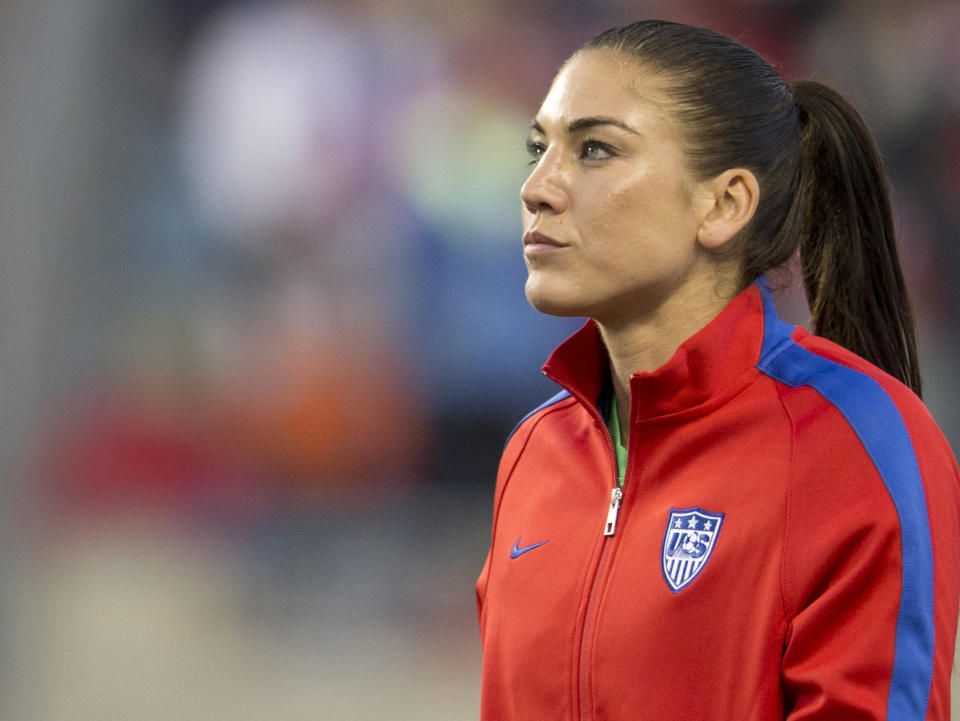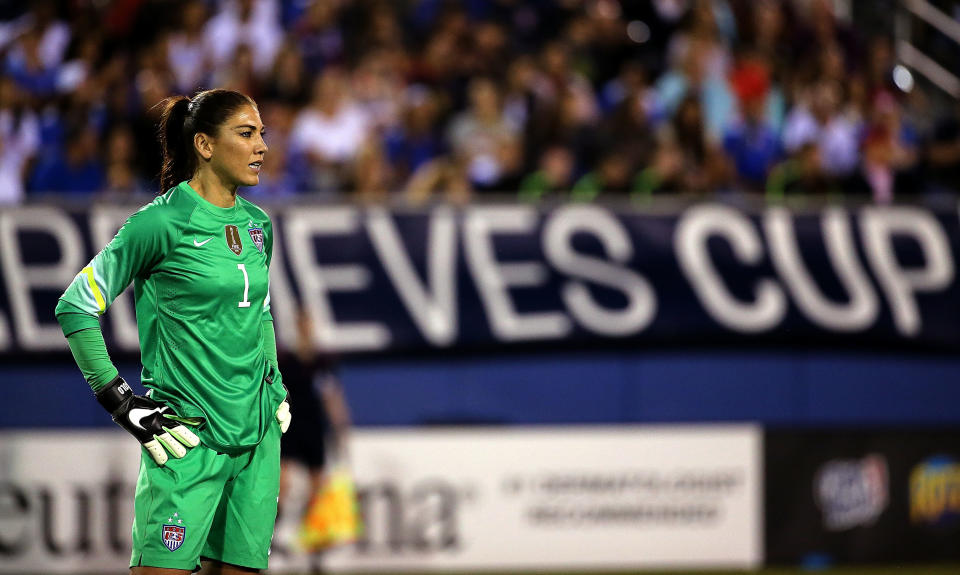Why the controversial Hope Solo might also be the change candidate U.S. Soccer needs

This Saturday, eight candidates for the presidency of U.S. Soccer will gather in Philadelphia for a forum. One of them has won a World Cup. One of them has won two Olympic gold medals. One of them has 200 caps as a national team member. One of them is among the most decorated soccer players America has ever produced.
All of those descriptors belong to the same candidate, and that candidate, in the eyes of most, is the only candidate without any chance at winning the presidency.
That candidate is Hope Solo.
The reasons for dismissing the former U.S. goalkeeper from contention are well-known. She was arrested (but never convicted) in 2014 for assaulting two family members. She was suspended from the national team for 30 days when her husband, former NFL tight end Jerramy Stevens, was pulled over for drunk driving in a borrowed team van. Finally, she was fired from the national team in 2016 for “conduct that is counter to the organization’s principles” after calling Swedish players “a bunch of cowards” after a loss in the Olympics.
Despite all this, there is a case for her candidacy. Allegations of violence in the home are always to be taken seriously, but whether you like her or not – whether you blame her or not – the good things Solo has done have been completely overshadowed. She has been a leader in the fight for women’s equal pay, which enlisted the support of members of the U.S. Senate. She has been heavily involved in charity work in the U.S. and elsewhere. And she has leadership skills. A former NASA astronaut, Ron Garan, wrote her a letter of recommendation that calls her “among the very best [leaders] I’ve ever met.”
Solo is not in the backslapping, old-boy crowd. She is, in some ways, not in any crowd. That’s clear when she talks about her goals.
“I want complete transparency,” she said in an interview with Yahoo Sports last week. “The women [national team] endlessly tried to disclose the amount of money provided to the Federation. The Federation refused to so even when senators asked. There’s something going on there. There’s a reason why they’re not being transparent. Show people where the money is going. Then all decide where to put the money.”
[ Follow FC Yahoo on Twitter and Facebook ]
Will she be taken seriously? Should she be? One major media outlet handicapped the race and declared Solo “has no chance at winning.”
Former national team member Eric Wynalda is given a great chance of winning. Yet his playing career was not without controversy. At the 1995 Copa America, he was involved in an altercation with former Argentina international and current Atletico Madrid manager Diego Simeone in a warm-up tunnel. Wynalda admitted to calling him a “piece of s—” and threatening to beat him up.
This interaction is written about positively on Major League Soccer’s own site, and Wynalda’s temper “was no secret,” the article says. It quotes him talking about a red card in the 1990 World Cup: “There was a temper there. It’s not a matter of controlling it. It’s a matter of changing negative energy into positive. That comes with experience.”
That sounds like something Hope Solo would say.
“I know [U.S. Soccer president] Sunil [Gulati] and [CEO] Dan [Flynn],” Solo said last week. “They very much are people who can fly off the cuff. You can look at Eric Wynalda, too. People think it’s great leadership. And that would never be perceived as something negative when you see it in a man.”
This is arguably a double standard that has plagued Solo her entire career. She first became famous outside of her sport when she criticized then-coach Greg Ryan for benching her in favor of Brianna Scurry in the 2007 World Cup Final, which the Americans lost 4-0.
“It was the wrong decision,” she said afterward, “and I think anybody that knows anything about the game knows that.” She was ridiculed, suspended and shunned for comments that any male athlete could have made with impunity and even support.
“A lot of the American media has made up their mind about me,” Solo said Friday. “U.S. Soccer uses the media to have the story they want told at that time. Sometimes it’s hard to navigate through.”
U.S. Soccer might do well to have someone who will speak truth to power. The women’s side won the 2015 World Cup, in some measure, because Carli Lloyd spoke up during the middle of the tournament and coach Jill Ellis made a key lineup change. The men’s side, meanwhile, is sitting home from the World Cup this summer in large part because of complacency and inertia. There is a talent gap, a diversity gap, and a grit gap. Solo says she can help fix all three.
“There’s something about when kids come from rich, top clubs, they don’t always know how to fight,” she said. “They don’t understand that opportunities come and go. They don’t take advantage of every opportunity they’re given.”
Everyone wants to find the next Christian Pulisic, and that’s certainly a priority. But he comes from a soccer background: his parents both played in college and his dad played professionally. Pulisic even spent a year in England at age 7. Michael Bradley was raised by a widely respected American coach. This isn’t to say they’re undeserving of their chance, but a lot of American kids – most American kids – are not as blessed. How can U.S. Soccer do better at finding the diamond in the rough, the kid from a middle-or-lower class background? Where is the next Clint Dempsey, who lived in a trailer park as a child? Or the next Solo, who came from a broken home and whose father was homeless for a time?
“The next little girl from Richland, Washington, has already been looked over,” Solo said. “Because of the system. … We should have more diversity in the world’s game. It’s been looked at as a white, rich kids sport. Adjust that. Reach out to all communities. Find the talent within. Kids don’t all have $15,000 a year in travel expenses and fees.”

Solo is the insider-outsider. She has played the game recently, yet she has always positioned herself as the dissenter. It was Solo and her teammates who refused to play a friendly in Hawaii in 2015 because of terrible field conditions. Solo posted a photo that went viral and ended any debate about whether the turf was safe.
“I fought inequities for 20 years on the team,” she said. “I was fighting from the outside. They looked at me as just a soccer player. They wanted me to shut up and kick the ball around and make some saves. It was time to attempt to do something to make changes that are necessary.”
Those changes are not just related to the pitch. They are related to the culture of sports overall. Solo recently charged former FIFA president Sepp Blatter with groping her at an awards ceremony in 2013. She told Yahoo Sports that she has seen inappropriate behavior from older men in the soccer community since her early days with the USWNT.
“There were situations where I got on the national team and I couldn’t believe what was going on,” she said. “I was a young girl from Richland, and I remember being in shock – not standing for it, not accepting it, and being told I’m just a prude. I was being told that not by men but by women. It was shocking. I felt so naïve.”
Asked to elaborate, Solo declined out of concern for the privacy of those who may have been mistreated.
“Lines were crossed for sure,” she said. “I saw it with other people for sure. I’ve witnessed it.”
At times in the last several years, USA Gymnastics and USA Swimming have failed to respond properly to allegations of sexual abuse. If U.S. Soccer wants to ward off anything similar, Solo’s insight might be useful.
“I’m not going to fall on the sword a million times,” she said. “I’m not going to do it anymore. I’ve been accountable. People don’t even know what happened [with the domestic assault allegations]. I haven’t been at the liberty to say everything because of the legal situation. One day I will be able to speak. It’s definitely not now. It hurts me every time I see inaccuracies. But people cannot sit there and say I haven’t taken responsibility.”
Many have tuned out Hope Solo. Her past is too discomforting, her honesty too blunt. But Solo speaks from an experience that is unique among all of the candidates.
Will the soccer community listen?


